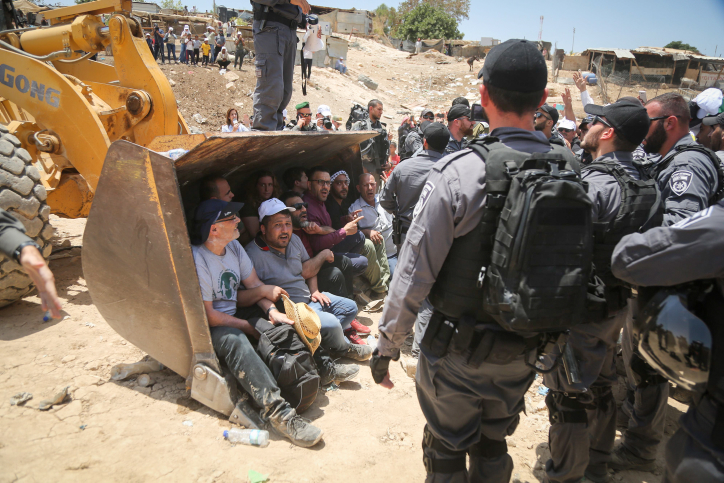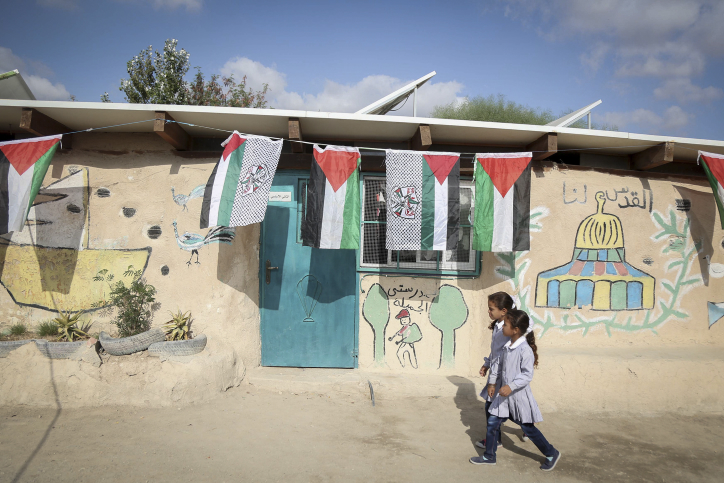As far as Israel is concerned, the demolition and displacement of Palestinian communities cannot be prevented, because they lack the good intentions that seemingly only Jewish settlers have.
By Sharona Weiss

An interim injunction that prevented the demolition and eviction of the Jahalin Bedouin village of Khan al-Ahmar ends on September 12. Israel will then face the weighty choice of whether to reveal the true colors of its decades-long occupation, and whether to forcibly transfer an entire community, simply for the inconvenience it poses to the settlement project.
Khan al-Ahmar is located between Jerusalem and the West Bank settlement of Ma’ale Adumim, an area known as E1. For decades, Israel has tried to drive Palestinians out of this area, as part of a broader strategy to form a bloc of settlements that will divide the West Bank, thereby preventing the territorial contiguity necessary for a two-state solution.
Israel’s High Court of Justice approved the demolition of Khan al-Ahmar on September 5, a ruling that could have significant ramifications for an estimated 13,000 Palestinian structures facing demolition orders in the occupied West Bank.
Just a week earlier, the Jerusalem District Court ruled to legalize Mitzpe Kramim, an unauthorized Israeli outpost in the West Bank. In an unprecedented legal tactic, the Jerusalem court ruled that the Mitzpe Kramim settlers erected their community “in good faith,” and granted them rights to the property.
Both Mitzpe Kramim and Khan al-Ahmar were built without the necessary permits – Mitzpe Kramim on privately owned Palestinian land, Khan al-Ahmar on so-called state (public) land that was confiscated from Palestinian landowners from Anata in 1975 (the question as to whether the government completed the plot’s registration as state land came up in proceedings). Both communities requested that their civilian structures be legalized retroactively.
The difference? Apparently, only one community has the quality of good faith: decent, well-behaved Israeli settlers who gained rights to property that they seized illegally, all because their intentions were assumed innocent. This legal argument could pave the way for the legalization of many other unauthorized outposts. But how could one consider these settlers as thieves or trespassers, when they carry such goodness in their hearts?

Bedouins, or other Palestinians, on the other hand? Their intentions are never presumed innocent. Even according to Israel’s highest court, their hearts do not hold enough virtue to allow the legalization of their schools and homes. Instead, Israel gave the 30-plus Bedouin families living in Khan al-Ahmar two choices: to be relocated near a garbage dump or next to a sewage treatment facility. As far as the state is concerned, their dreams are not lofty enough, better fit for crumbling among garbage or sewage.
The Israeli government once again demonstrated that it views Jewish settlers as too good, too superior to suffer any consequences for their “well-intentioned” disregard for the law. Even those hailing from illegal outposts such as Adei Ad, where settlers not only build without permits, but also consistently harass and employ violence against Palestinians as a tool to take over their land, enjoy significant rewards. These include expansive jurisdictions, protections, and, of course, legalization. Can one imagine if the residents of Adei Ad were offered to live next to garbage or sewage? Surely not. Their aspirations, and those of their children, are seemingly too precious for the state.
Israel has arrived at a precipice: to go forward with an act that will, in many ways, define its moral trajectory, and its reputation around the world, or to choose restraint for the sake of all of our futures. Ironically, this occurs just before entering a period of collective and personal introspection, before the holiest day of Yom Kippur, and before Sukkot, a holiday in which Jews remember what it was like to live without shelter while desperately escaping oppression.
As we step into the High Holidays, will Israel simply turn away from the imploring eyes of the children in Khan al-Ahmar as their school is potentially destroyed, and as they face eviction from their homes? If so, we will communicate a very clear message: your dreams, little ones, are simply a hindrance to the Jewish State; your futures will be sacrificed on a field of political maneuvers, and your hearts are simply not full of the good faith that children in Jewish settlements hold as they expand to enjoy your land, and wreak havoc on your way of life – with all the best intentions, of course.
Sharona Weiss works as the Director of international relations and advocacy at the Israeli human rights organization, Yesh Din.
